Are Your Giveaways Illegal? (+How to Do a Legal Giveaway)
 John Turner
John Turner
 John Turner
John Turner
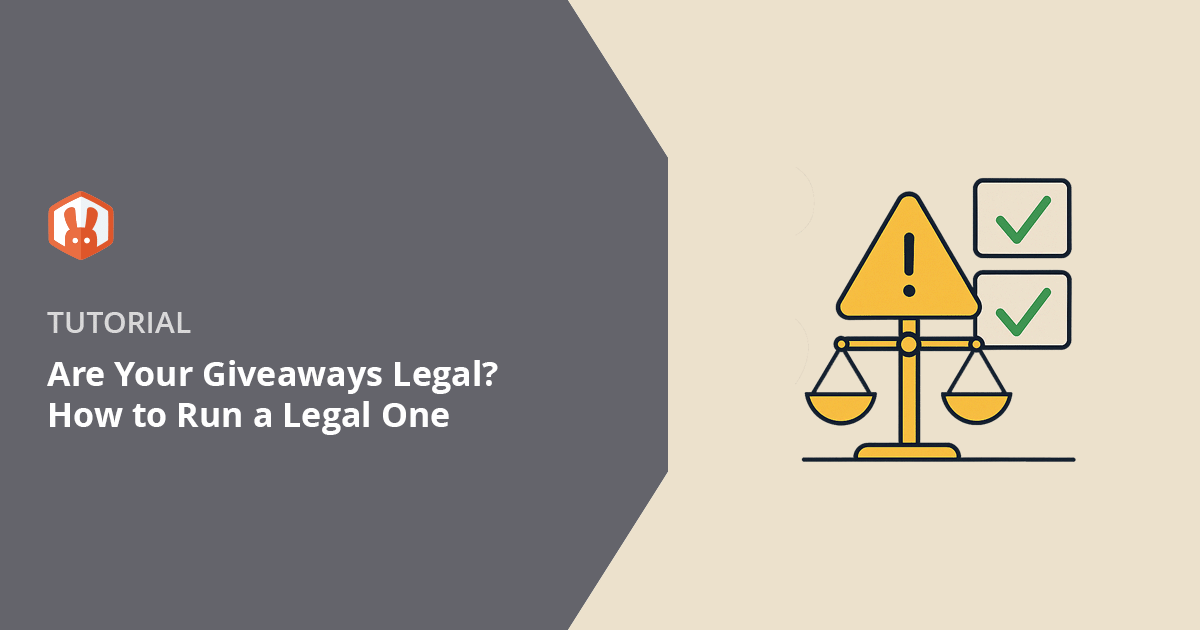
I used to think running a giveaway was as simple as offering a prize and picking a winner. But then I realized that without even knowing it, I could have been breaking the law.
Most business owners don’t mean to run illegal giveaways. The truth is, many just don’t know the rules. I didn’t either when I first got started.
In this post, I’ll show you what actually makes a giveaway illegal, clear up a few common myths, and share real examples of what can go wrong. You’ll also get a simple checklist to follow and see how I keep things legal using RafflePress.
This guide is practical and beginner-friendly. It’s not full of scary legal talk or hard-to-follow advice. If you’ve ever worried you might mess something up, don’t stress. You’re in the right place.
In this guide:
What Actually Makes a Giveaway Illegal?
Before I learned the rules, I didn’t know there was a legal difference between sweepstakes, contests, and lotteries. But it turns out those differences matter a lot.
A sweepstakes is when winners are picked at random and no purchase is required to enter. A contest is based on skill or merit, like voting or judging. A lottery includes all three elements: chance, a prize, and some form of payment.
Unless you have a license, running a lottery is illegal in the U.S.
So if your giveaway asks people to buy something to enter, you might be crossing that legal line. Even something like “tag three friends with no other way to enter” could be a problem if it doesn’t offer a free alternative.
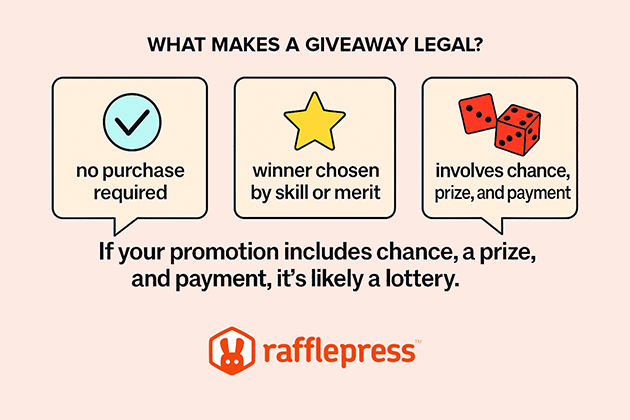
Here’s a simple rule I follow: If your promotion includes chance, a prize, and payment, or makes people work really hard to enter, it’s likely a lottery.
You can learn more about these definitions in my full guide: Sweepstakes vs Contest vs Lottery
It’s worth taking a moment to look back at your past contests with fresh eyes. A small detail might be the only thing standing between a legal giveaway and an illegal one.
The Myths That Get Small Businesses Into Trouble
One of the biggest reasons small businesses run into trouble with giveaways is that they’ve picked up the wrong advice, or just followed what everyone else is doing.
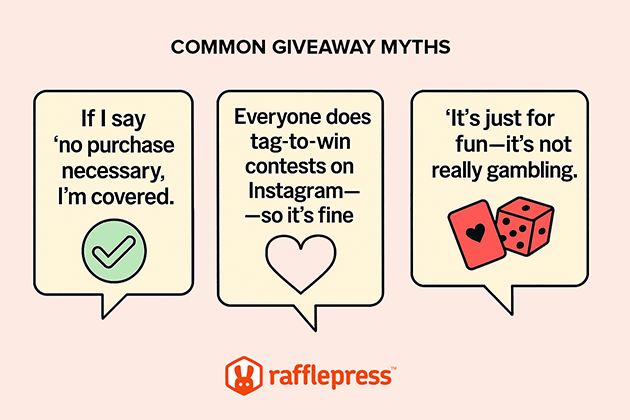
Let’s break down a few of the most common myths I’ve heard.
Myth 1: “If I say ‘no purchase necessary,’ I’m covered.”
Not exactly. If the free entry option is buried, confusing, or hard to access, it still might not meet legal requirements.
Myth 2: “Everyone does tag-to-win contests on Instagram—so it’s fine.”
Just because something’s popular doesn’t mean it’s legal. Social platforms don’t police giveaway laws. That part is still on you.
Myth 3: “It’s just for fun—it’s not really gambling.”
Unfortunately, legal definitions focus on what your giveaway includes, not how you describe it. If it walks like a lottery, it might be treated like one.
I’ve seen these myths trip up brands that had the best intentions. This stuff isn’t always obvious, especially when you’re just trying to grow your audience or give back to your community.
Free: Download Our Giveaway Playbook
Templates, prize ideas, and promotion strategies in one guide.
How to Do a Legal Giveaway in the U.S.
Once I understood how giveaways are classified, I wanted a clear way to make sure mine followed the rules. This checklist is what I now follow every time.
| Legal Requirement | What It Means |
|---|---|
| Free entry method | Never require a purchase or payment to enter. |
| Official rules | Write clear rules and make them easy to find. |
| Eligibility requirements | Be specific about age, location, and any other limits. |
| Start and end dates | Include the time zone and don’t change it mid-way. |
| Prize details and value | Say exactly what the winner will get and what it’s worth. |
| Winner selection method | Explain how you’ll choose winners and when. |
| Notification process | Let people know how and when they’ll hear if they win. |
| Privacy notice | Tell entrants how their data will be used and stored. |
| Platform compliance | Follow the rules for wherever you promote your giveaway, like Instagram or Facebook. |
If you want help writing the rules, here’s a simple guide I use: How to Write Giveaway Rules Like a Pro
When you follow this checklist, you’re not just protecting your business. You’re also showing your audience that you run things fairly and transparently.
Real Giveaways That Went Wrong (and What You Can Learn)
Sometimes the best way to understand what not to do is to look at what’s already gone wrong. These real-life examples show how easy it is to cross the line, and what to learn from each one.
Reese’s $25,000 Promotion
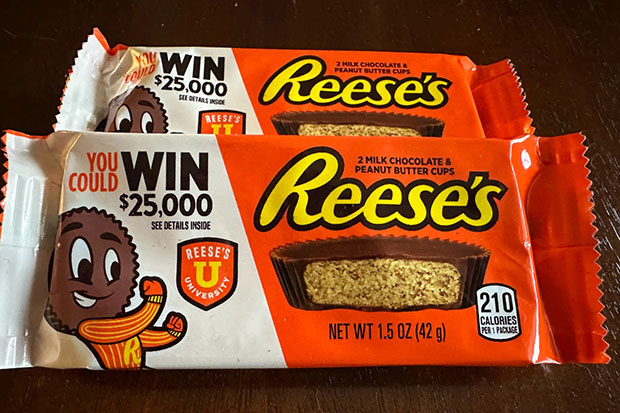
In this giveaway, people were told they could win $25,000 by entering codes found inside Reese’s candy wrappers. But the free entry method was hidden inside the product, meaning people had to buy first to learn how to enter without paying.
Lesson: You must clearly offer a no-purchase entry option upfront. Hiding it inside the packaging doesn’t count.
GM’s Online Contest Data Breach

In 1999, General Motors ran an online sweepstakes for their Pontiac and Buick brands. A flaw in the contest website exposed personal information of over 13,000 entrants, including names, phone numbers, and email addresses. The issue happened because users could change the URL to access other people’s data.
Lesson: Prioritize cybersecurity when you run online sweepstakes. A simple oversight can lead to a data breach, violating privacy and losing customer trust.
Royalux Competitions’ Prize Draw Controversy

In 2024, Royalux Competitions ran a paid-entry prize draw for a £5,000 garden makeover and £2,000 in cash. The winner turned out to be the brother of the garden makeover supplier. While the original terms excluded employees and their families, Royalux changed the terms after announcing the winner to allow it. The ASA ruled this was unfair and banned the competition in its original form.
Lesson: Never change your giveaway rules after it begins, especially to benefit someone with a connection to your business. Doing so can break trust and lead to legal or regulatory trouble.
P.Louise’s Advent Calendar Raffle

This beauty brand sold raffle tickets for £5 each, giving customers the chance to win big prizes like beauty bundles. But they didn’t have a proper gambling license, and the event was investigated by UK regulators.
Lesson: Paid raffles are a type of lottery. If you’re charging for entry, you need the right legal permissions, no matter how popular your brand is.
Even if your audience is excited and your intentions are good, skipping the legal steps can land you in serious trouble. These examples are a good reminder that small details matter a lot.
How RafflePress Helps You Run Legal Giveaways

If you’re new to it, RafflePress is a WordPress giveaway plugin that lets you build and manage giveaways directly on your WordPress website. It takes care of the tech and legal details so you can focus on growing your audience and getting more entries.
I started using it after realizing how many little things could go wrong when running a giveaway. Instead of trying to keep track of rules, entry types, and winner selection on my own, I now let RafflePress handle all of that for me.
RafflePress has a built-in rules section, so you can add your terms and conditions right into the giveaway widget. You don’t need to write legal text from scratch.
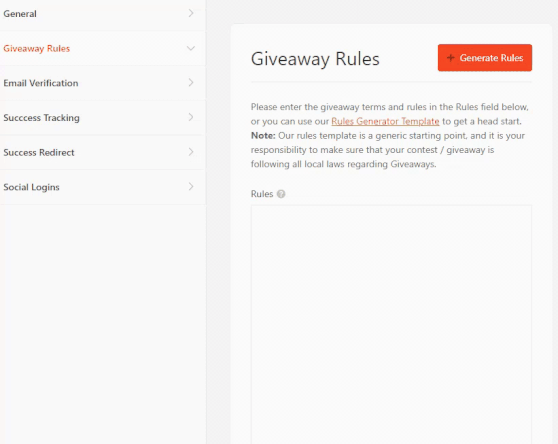
Every giveaway includes a free entry method by default, which keeps you on the right side of sweepstakes law.
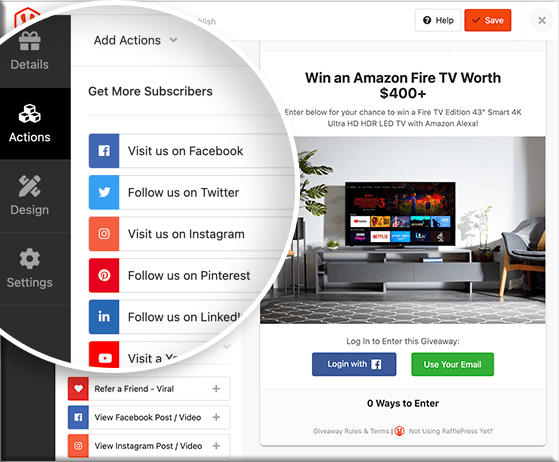
The plugin also includes a random winner picker. This keeps the process fair and avoids any awkwardness if you’re running a sweepstakes instead of a skill-based contest.
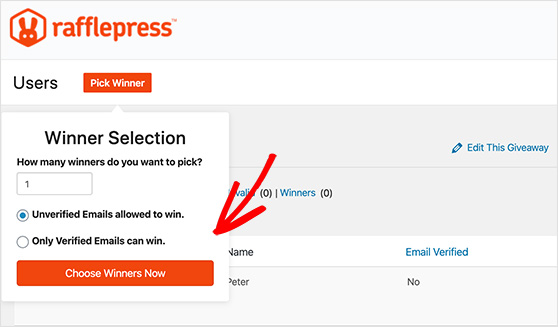
I also like that RafflePress includes fraud protection, so things like duplicate entries and bots don’t mess up the results.
Since everything is hosted on your own WordPress site, you stay in control of how entries are collected and where the data goes. That’s a big deal if you care about privacy and transparency.
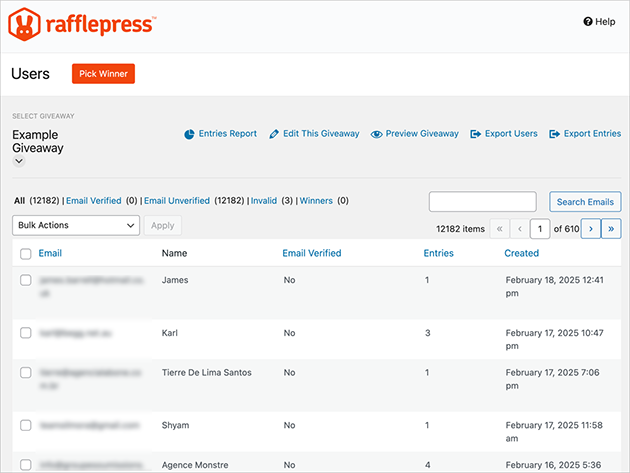
This is the setup I trust when I want to run a giveaway that feels professional, fair, and legally safe, without spending hours double-checking every detail.
FAQs About Giveaway Legalities
Final Thoughts on Running a Legal Giveaway
Now you’ve seen what actually makes a giveaway legal, and what can get you into trouble if you’re not careful.
The good news is, you don’t need to be a lawyer to run a safe and successful contest. You just need to follow a few clear rules and avoid the common mistakes most people don’t know about.
When you take the time to do it right, your giveaway builds trust, encourages more entries, and protects your business in the long run.
Want to run your next giveaway the smart (and legal) way?
Try RafflePress today and launch a giveaway that grows your audience, without worrying about breaking the rules.
If you want to go deeper or start planning your next giveaway, here are a few guides I recommend:
- How to Create Custom Giveaway Images for Free
- Giveaway Copywriting Tips That Drive More Entries
- How to Use Contest SEO to Boost Your Website’s Rankings
- How to Pick a Winner for a Giveaway (Fairly)
- Best Online Sweepstakes Websites to Promote Your Contest
Each one is packed with beginner-friendly tips to help you grow faster and avoid the usual giveaway mistakes.
If you liked this article, please subscribe to our YouTube Channel for RafflePress video tutorials. You can also find us on Twitter and Facebook.

